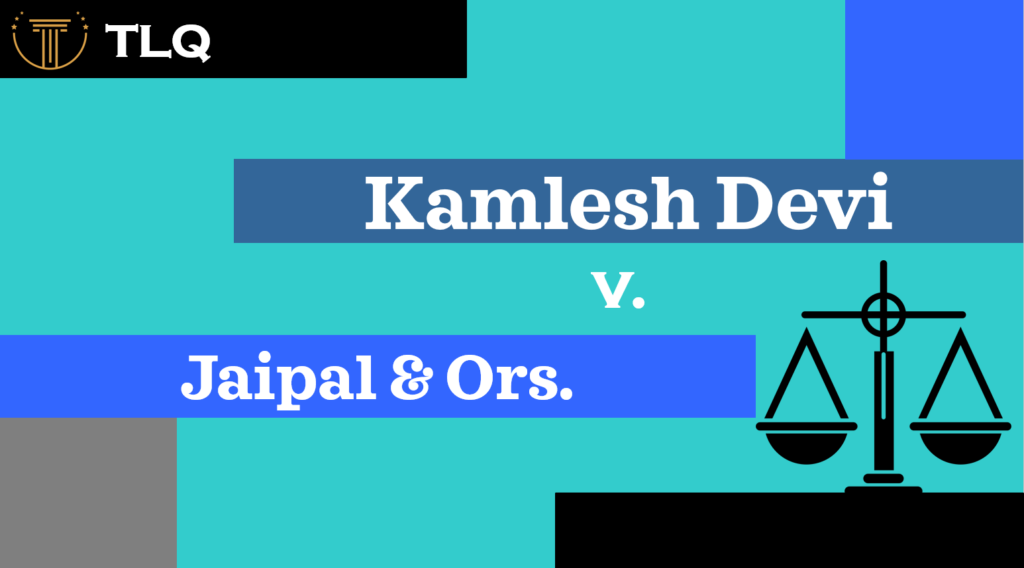Published on 1st May 2025
Authored By: Pallavi Ankush Ghorpade
Guru Nanak Vidyak Society's Law College (University of Mumbai)
Case Name and Citation
- Bilkis Yakub Rasool v. Union of India & Others
- Supreme Court Judgment on Remission: January 8, 2024
- Citation: [2024] 1 S.C.R. 743 : 2024 INSC 24
Case Background and Facts
The Bilkis Bano case is one of the most significant legal battles in India’s history, dealing with communal violence, sexual violence against women, and miscarriage of justice. It originated during the 2002 Gujarat riots, wherein Bilkis Bano, a five-month pregnant woman, was subjected to a brutal gang rape, and 14 members of her family, including her 3-year-old daughter, were killed by a violent mob. The local police initially attempted to cover up the crime, which led to the case being transferred to the Central Bureau of Investigation (CBI) and subsequently heard in Maharashtra for a fair trial.
Legal Issues
- Criminal Prosecution:
- Identification, trial, and conviction of the perpetrators responsible for gang rape and murder.
- Examination of the complicity of local police and medical officials in mishandling the investigation.
- Remission of Sentence:
- The legality of the Gujarat Government’s decision to grant remission to the 11 convicts in 2022.
- Jurisdictional concerns, as the trial and conviction took place in Maharashtra, thereby questioning Gujarat’s authority in granting remission.
Arguments of the Parties
Prosecution (CBI):
- Established that Bilkis Bano was raped, and her family members were murdered by the accused.
- Argued that local police officials deliberately manipulated evidence and did not conduct a fair investigation.
- Opposed remission granted by the Gujarat government, asserting it was legally unauthorized.
Defense:
Questioned the validity of witness identification.
- Justified remission on grounds of good behavior and completion of a significant portion of the sentence.
Judicial Decisions
- Bombay High Court Verdict (2017):
- Upheld life imprisonment for 11 convicts based on clear evidence of their involvement in the crime.
- Convicted several police officers and doctors for tampering with evidence.
- Supreme Court Verdict (2024):
- Held that the Gujarat Government lacked the authority to grant remission, as the trial was conducted in Maharashtra.
- Declared the remission orders invalid and unconstitutional, directing all 11 convicts to surrender within 15 days.
Legal Reasoning and Analysis
- The Bombay High Court‘s decision reinforced the importance of accountability for both perpetrators and complicit state officials in cases of communal violence.
- The Supreme Court of India reaffirmed the jurisdictional limits in remission cases, ensuring that only the state where the trial occurred (Maharashtra) had the power to decide on remission. The ruling also emphasized the importance of preventing political and administrative misuse of remission powers.
Ratio Decidendi (Key Legal Principles Established)
- Accountability in Communal and Gender-Based Violence: Perpetrators of heinous crimes, including sexual violence, should face severe legal consequences, and state officials cannot escape liability for their failures.
- Jurisdictional Adherence in Remission of Sentences: The Supreme Court clarified that remission authority remains with the state where the trial took place, thereby preventing jurisdictional overreach and ensuring fair legal procedures.
Obiter Dicta (Court’s Observations)
- The Supreme Court emphasized that remission should not be granted arbitrarily and should always align with constitutional morality and justice.
- Stressed the need for uniform application of remission policies to prevent politically motivated decisions.
Conclusion and Significance
The Bilkis Bano case is a landmark in India’s legal history, reinforcing the importance of judicial intervention in upholding justice, especially in cases of communal violence and gender-based crimes. It set a precedent in protecting victims’ rights against state-initiated injustices and emphasized the need for strict judicial oversight over remission policies.
This case reaffirms the principle that justice must not only be done but must be seen to be done, ensuring victims of heinous crimes receive fair and unwavering legal protection.
References
- Bilkis Yakub Rasool v. State of Gujarat & Others, (2019) 6 SCC 1.
- Bilkis Yakub Rasool v. Union of India & Others, Writ Petition (Crl.) No. 491 of 2022, decided on January 8, 2024.
- Mukesh K. Tripathi v. Senior Divisional Manager, LIC, (2004) 8 SCC 387.
- Amrit Das v. State of Bihar, (2000) 5 SCC 488.
- State of Maharashtra v. Budhikota Subbarao, (1993) 3 SCC 71.
- Union of India v. V. Sriharan, (2016) 7 SCC 1.
- Laxman Naskar v. Union of India, (2000) 2 SCC 595.
- State of Haryana v. Jagdish, (2010) 4 SCC 216.
- Reports from Manupatra, SCC Online, and All India Reporter (AIR) databases on the Bilkis Bano case developments.



